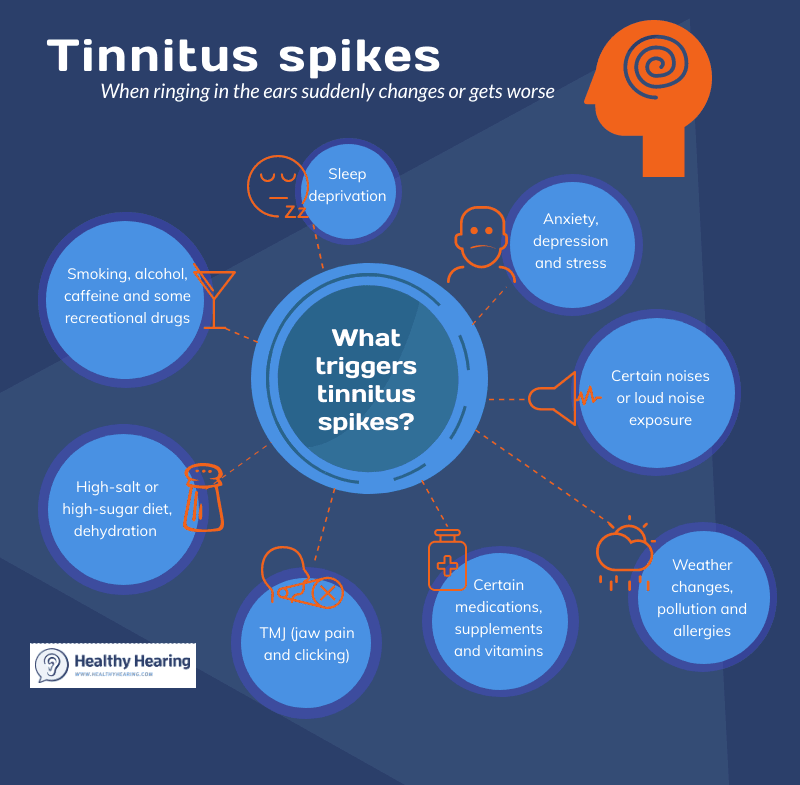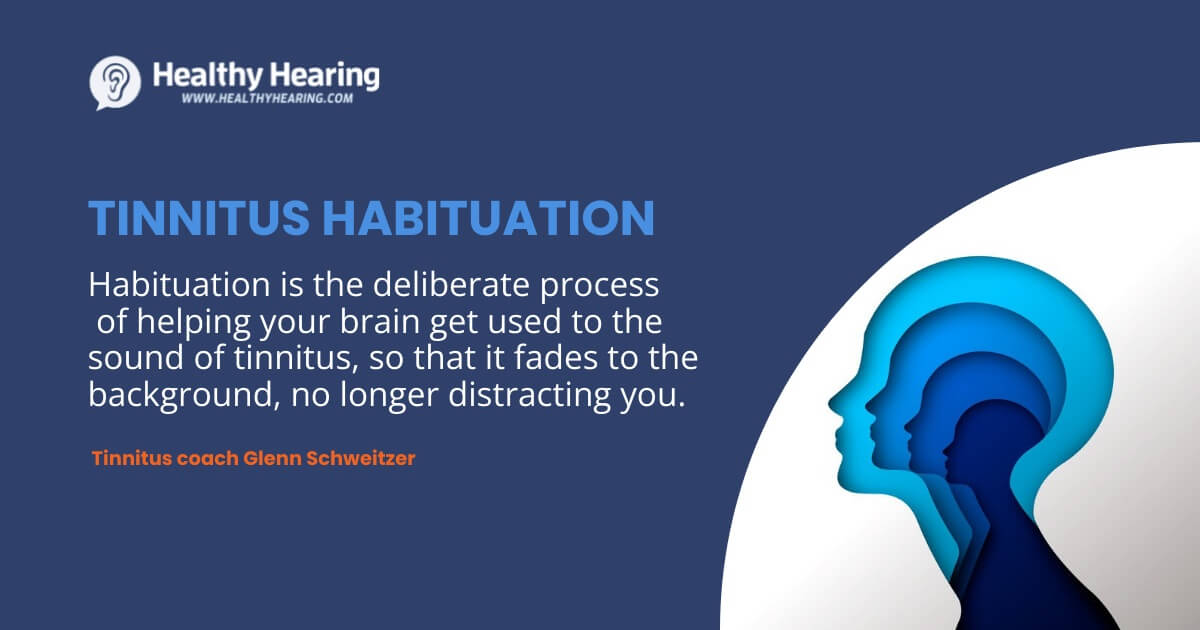|
www.HealthyHearing.com |
Tinnitus habituation: An essential skill for reliefWhy it works and how to get started
Contributed by Glenn Schweitzer Almost everyone has experienced ringing in their ears at one point or another, but when the sound never stops, it can feel like torture. 
Millions of tinnitus patients around the world deal with this reality daily. But I want to be very clear: If you are suffering from tinnitus, there is so much hope. Despite what you’ve seen online or what your doctor might have told you, you can do something about your tinnitus. There may not be a cure for tinnitus, but lasting relief is entirely possible with tinnitus habituation. What is tinnitus habituation?Habituation is the act of "getting used to" tinnitus, to the point you learn to tune it out. Yes, this means you get to a place where your tinnitus stops bothering you entirely, where your brain just stops paying attention to it and it fades from your awareness. When you’re suffering, it’s hard to wrap your mind around how something like this could be possible. When faced with the idea of habituation, many tinnitus patients instinctively think, “My tinnitus symptoms are too loud—I could never ignore something this horrible.” Instead of diving into the technical aspects of the science of habituation, I want to offer you an easier way to understand what it means to habituate and explain why I believe that it’s not just possible for every tinnitus sufferer, but the best strategy for lasting relief.
Tuning it outThere is nothing “broken” about your ears, brain, or nervous system that would ultimately prevent you from tuning out the sounds of tinnitus. We all have sensory filtering mechanisms in our brain that work automatically, all the time, to filter meaningless sensory information out of our awareness. Think of all the things you aren’t paying attention to right now: the feeling of your clothes on your skin, everything in your peripheral vision, and the air temperature. Ever walk into a smelly room, only to forget about it a few minutes later? Same process. We ignore and filter out background noise and sounds this way, too. It’s how people are able to focus and be productive in noisy work environments. It’s also how you can have a conversation in a loud restaurant without being drowned out by the ambient noise of people talking around you. In a very real sense, your brain can turn down the perceived volume of unimportant noise so you can focus on the sounds that matter, regardless of what caused your tinnitus. 
habituation techniques to find relief. Two obstacles in the wayMany tinnitus sufferers mistakenly believe that the sound itself is the root of their problem. Of course, if the sound was gone tomorrow, their suffering would end. But until there's a cure, we have to learn to control our thoughts and how we react to the sound emotionally, psychologically, and physiologically. When you dig a little deeper, you find that there are two specific obstacles that prevent a sufferer’s brain from effectively ignoring or tuning out the sound of their tinnitus, and they’re not at all obvious. 1. Ringing in the ears can increase anxietyThe first obstacle is that we evolved to use sound as a way to monitor our environment for danger and threats. As a result, when we hear the sound that our brain interprets as something dangerous, we experience a fight-or-flight stress response. This panicky state doesn’t feel very good, but it helps us to confront dangerous situations or get away safely. Almost instantaneously, stress hormones like adrenaline and norepinephrine are released into the bloodstream, allowing us to run faster and hit harder for a short period of time. Our senses also become heightened and that’s part of the problem: It becomes impossible to ignore any sound that implies danger to your brain. After all, you would never want to miss the sound of something actually dangerous approaching. 2. Your brain reacts as if the threat is realWhich brings us to the second obstacle: Our brains just cannot tell the difference between real danger and an imagined threat like tinnitus. Public speaking is another good example of this kind of problem. There is nothing physically dangerous about public speaking, but many people still experience fight or flight in front of an audience. The reason is fear. Our fear makes the danger real to our brain, whether it’s real or not, and so our reaction is the same: We have a stress response. Overcoming the stress response cycleNormally, when a dangerous situation is resolved, our parasympathetic nervous system is activated. The opposite of the fight-or-flight response, it's known as "rest-and-digest." But with tinnitus, you can get stuck in a state of fight or flight that never really ends because the sound doesn’t just magically disappear.
Unfortunately, it often gets worse, because the brain starts to associate the emotional fall-out of an experience like this—the anxiety, panic, anger, frustration, anguish, depression, and stress—with the sound of your tinnitus. These negative emotions are snowballed into the reaction, and become are part of the reaction, leaving you with something much worse than a simple fight-or-flight stress response. I call it the tinnitus stress response. Some people do habituate naturally and find their tinnitus bothers them less and less over time, but not everyone. For many sufferers, it just gets more and more difficult, and tinnitus rumination starts to affect every single aspect of their quality of life. If you have an accompanying balance disorder, the anxiety alone can be hard to manage. And as the anxiety, panic, and stress increase, the tinnitus often seems louder and spikes more frequently, which in turn makes sleep difficult, which affects focus and productivity, and so on. You get trapped in a vicious cycle. But the cycle can be broken. Finding tinnitus relief through habituationTo find relief from tinnitus, you must remove the obstacles that prevent habituation from occurring naturally. In simple terms, this means changing the way you react to the sound emotionally, psychologically, and physiologically. But understanding why habituation is possible is only part of the equation. It also requires an effective strategy, hard work, discipline, and time to see results. And the process itself doesn’t happen all at once. Tinnitus habituation is a processHabituation is a progression where relief occurs in stages, and it’s not an “every day is better than the day before” kind of experience. For most people, it’s 3 steps forward, 2 steps back, or even 3 steps back, over and over again. Spikes in tinnitus and difficult days are an unfortunate and unavoidable part of the process. But you also don’t need to get to the finish line to see improvement. Quality of life improves across the board, at every point of the process. How I habituated and how you can, tooI was personally able to habituate from severe tinnitus (caused by Meniere’s disease) with a somewhat unique, and counterintuitive strategy that involved focusing on my tinnitus during meditation. Meditation lowered my tinnitus anxietyBecause meditation is such a calming and relaxing mental exercise when practiced regularly, and because anything can be used as the focus of meditation (it doesn’t have to be your breathing or a mantra), my brain started to associate the state of relaxation with the sound of my tinnitus, which I now call my accidental triumph over tinnitus. As a result, this new reaction slowly replaced the old reaction of fear, anger, and anxiety, and I was able to fully habituate to the sound. 
Other tinnitus habituation strategiesThe good news: It’s certainly not the only way. There are many other strategies, such as sound therapy and cognitive-behavioral therapy, that can help you to habituate as well. What the research saysResearch has shown that consistent habituation practices can yield succesful results. A 2021 study had volunteers particpate in tinnitus habituation therapy for six months. They found statistically significant reductions in the perception of tinnitus "in relation to loudness, discomfort, and its impact on the quality of life." Another study found that patients who completed a tinnitus habituation therapy program maintained their “positive and significant” improvements in depression and anxiety even five years after treatment ended. Do hearing aids work for tinnitus?Yes, sometimes simply wearing hearing aids for tinnitus can be enough, since hearing loss and tinnitus often go hand-in-hand. Hearing the full range of sound again helps you forget the tinnitus, which for many tends to fade into the background. Find tinnitus treatment near youIf you are experiencing ringing in the ears, it's important to get a thorough hearing evaluation. Find a tinnitus clinic near you by going to our directory of hearing care providers. Please note that not all hearing clinics treat tinnitus, so you may need to browse several clinic pages to find the right provider. Read Glenn's full series on habituation:Glenn Schweitzer
|
Featured clinics near me
Earzlink Hearing Care - Reynoldsburg
7668 Slate Ridge Blvd
Reynoldsburg, OH 43068

Find a clinic
Need a hearing test but not sure which clinic to choose?
Call 1-877-872-7165 for help setting up a hearing test appointment.



 Glenn Schweitzer is an entrepreneur, blogger, and the author of Rewiring Tinnitus and Mind over Meniere’s. He is passionate about helping others who suffer from tinnitus and vestibular disorders and volunteers as an Ambassador Board Member for the Vestibular Disorders Association (VEDA). Through his blogs, he continues to raise awareness for tinnitus, Meniere’s disease, and other vestibular disorders, spreading his message of hope to those in need.
Glenn Schweitzer is an entrepreneur, blogger, and the author of Rewiring Tinnitus and Mind over Meniere’s. He is passionate about helping others who suffer from tinnitus and vestibular disorders and volunteers as an Ambassador Board Member for the Vestibular Disorders Association (VEDA). Through his blogs, he continues to raise awareness for tinnitus, Meniere’s disease, and other vestibular disorders, spreading his message of hope to those in need.